No Man’s Sky
Released August 9, 2016
Platforms: Playstation 4 and Microsoft Windows
Developed & Published by Hello Games
Distributed by Sony Interactive Entertainment (PS4) and iam8bit (PC)
Though the cosmic dust has not yet settled, there is, without doubt, a sense that No Man’s Sky offers insight into the ever evolving way we look at and think about video games. At the very least, the numerous polarizing reviews reveal a tone that this digital creation is something of note. With little middle ground being vocalized, No Man’s Sky continues to create a buzz due to the numerous unknown elements still being sought out by players and the potential for future expansion by the game’s creators. For me, this uncertainty reveals a number of timeless philosophical issues. I am most fascinated when reading how those 40-something gamers reminisce about precursory experiences on games like Elite (1984), the obvious parallels with sci-fi classic films like Stanley Kubrick’s 2001: A Space Odyssey (1968) and Isaac Asimov’s influential writings developed in the Foundation series (1942-1993), the luscious, yet foreboding, atmospheric experiences encountered, and the posing of difficult and potentially unanswerable questions to the game’s players.
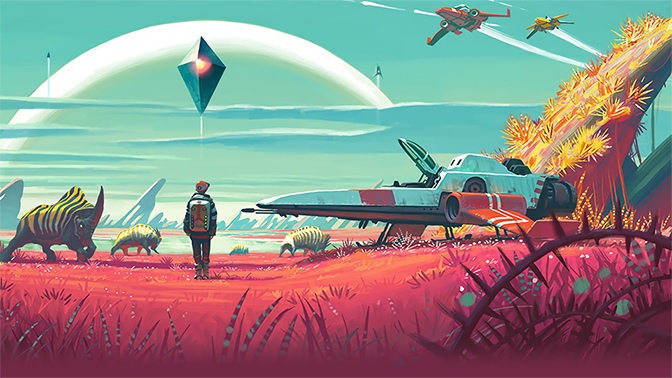
At outset, you are dropped into unknown terrain upon a planet that holds cursory familiarity, yet little clue outlining any clear linear objectives. Your first task is to repair an inoperable space vessel through collecting and assembling resources. Upon completion, you are then to traverse a near infinite universe assembling information and resources while avoiding predators to the center of interconnecting galaxies. This introductory experience may appear simple at outset. However, in No Man’s Sky, there is very little hand-holding. I am now almost 20 hours into No Man’s Sky, and the game’s four primary pillars — exploration, survival, combat, and trading are now recognizable, but only at a novice level (Yes, my journey has unfolded a bit slower the most). In this open world, you must be willing to explore and experience No Man’s Sky at your own pace. This can be frustrating, and cause pause. In many games today, we are walked through the gameplay and objectives via a tutorial. This is not the case here. Other than the occasional hint that pops up onscreen to nudge you along, you are alone. This unorthodox approach forces you to make decisions that have a multitude of repercussions due to the procedural generated algorithms for which the game is built upon.
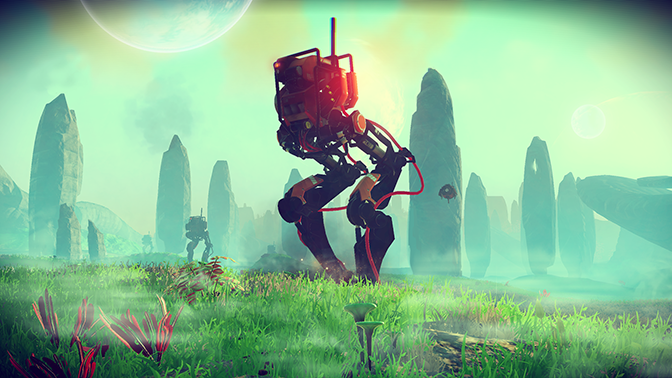
No Man’s sky reaffirms that we are now in a place where video gaming has matured far beyond solely a recreational activity for children. Simply put, the aesthetics and philosophy in this game continue to establish the video gaming medium as a contemporary art form indicative of the here and now. Like other established arts, there is a past, present and future supported by deliberate aesthetics, evolving history, and complex philosophies. This can be seen in the pervasive dialogues seen in our present popular culture and fine arts milieu. People are talking about video gaming with a fervor similar to that seen during the inception of photography and other art forms that spoke about a specific time and place. One can only surf the net and read the numerous accounts from old-school gamer’s about an 8-bit recall experience, the obvious connections being identified between recently released games and long standing important works of fine art, and the expanding of our cultural dialogue due to the current innovations occurring in Triple-A to Indie Studios. In many respects, this discipline is providing some of the most profound, engaging, and experimental investigations occurring today.
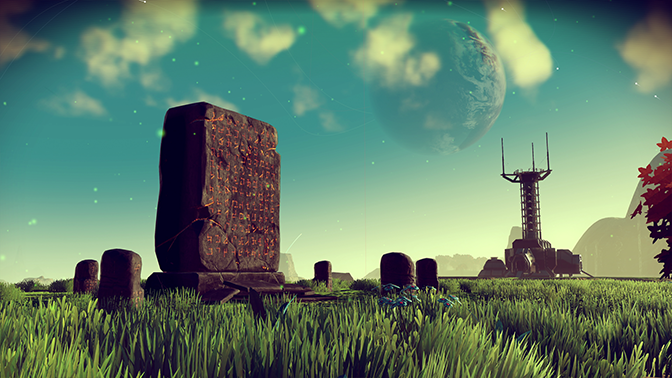
No Man’s sky is remarkably beautiful. The team at Hello Games led by artists, Grant Duncan and Jacob Golding, have simplified the color palette for each planet while simultaneously producing varied environments that reference an expansive collection of sci-fi related classics. One can see the fantastic creatures of Edgar Rice Burroughs and Frank Frazetta, the often bizarre settings on the covers of mid 20th c. pulp magazines, and the uncanny atmospheric imagery of Gene Roddenberry’s original Star Trek. Playing and thinking about No Man’s Sky forced my collective memory to open up to places not visited in years. The experience was refreshing, however the repetition did become tedious. And, for some (not me) this rhythmic reiteration will cause backlash in a time where much of our games center upon annihilating a foe or objective. There are shooting elements, but this can become tertiary if one chooses to focus upon exploration and trading. As I write, I wander if data is being collected on player choices? No Man’s Sky holds a curious place in that the game is cyclic in nature, yet focuses upon developing an experience that is built from unique responsive choices. Are we a species predominately focused upon destroying or exploring? I can only imagine that there must be a gold mine of information damning our present day behavior!
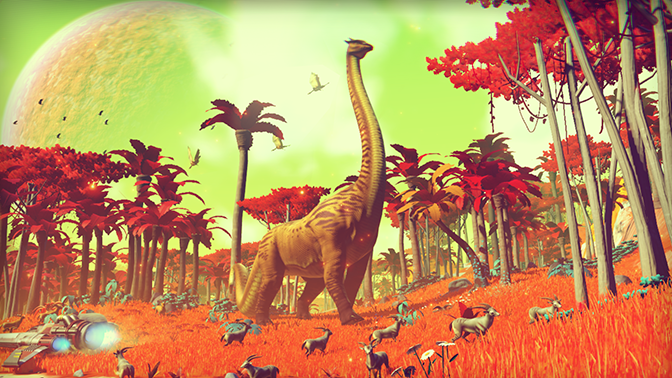
Regardless of your style of play, you will encounter an ethereal soundtrack that enhances this 4-D adventure. Sheffield, England’s electronic post/math rock quartet, 65daysofstatic, produced a sublime sequence of music, sound, and sensual auditory details that can bring rise to moments of meditation, then swiftly shift to a frenetic pace when dealing with a sentinel’s response to your odious conduct. In No Man’s Sky there is distinct selection in the type of music. Created, is a digital otherworldly aura felt via the harmony, tonal, and sonic style. The soundtrack completes this multi-dimensional encounter nicely, yet I sense I want more. Yes, there are items that need to be tweaked. This is not uncommon in a game of this scale. And yes, there may be excessive repetition. This remains the white elephant in the room. But what I am wandering is whether the current iteration is a platform for future development. What I would like to see is the ability to build structures like that seen in games like Minecraft and Fallout. Is this even possible with the current game engine? This may be already be present, yet I have not encountered to date. Something to gnaw on?
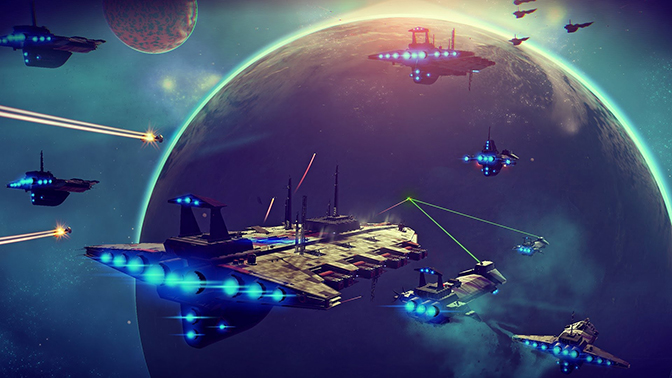
While playing last night, I was pressed to consider my acts beyond merely pulling a trigger. There’s something much bigger, something unknown, something so similar to real life in No Man’s Sky. Oddly, I have been thinking about Samuel Beckett’s verse, “…it will be the silence, where I am, I don’t know, I’ll never know, in the silence you don’t know, you must go on, I can’t go on, I’ll go on,” from The Unnamable (1953) as I collect plutonium, iridium, and carbon, while hoping to locate a more attuned understanding of the game (and, perhaps, my own being). I have not read anything by Beckett in probably 25 years, yet now I am curious enough to revisit this work and consider those heady ideas I struggled with in my youth. This, and No Man’s Sky disjointedness and lack of concrete plot is why I continue to play. I am uncertain of how my journey will unfold, but at this moment in time, I am finding an excitement (and imbalance) unlike that felt in my gaming experience for quite some time.
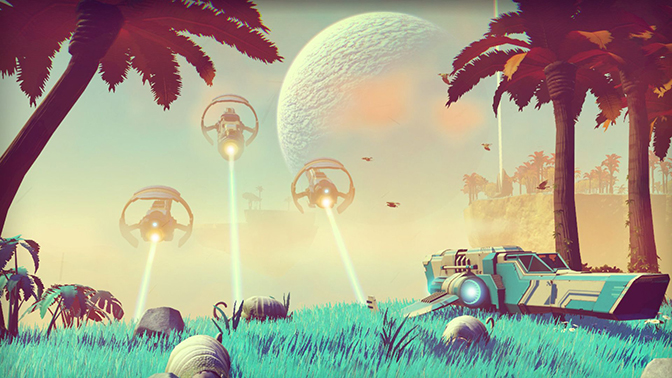
For additional information on No Man’s Sky, please visit:
No Man’s Sky – http://www.no-mans-sky.com/
Hello Games – http://www.hellogames.org/
All “No Man’s Sky” images © Hello Games, Guildford, England, 2016
Review by Chester Alamo-Costello


